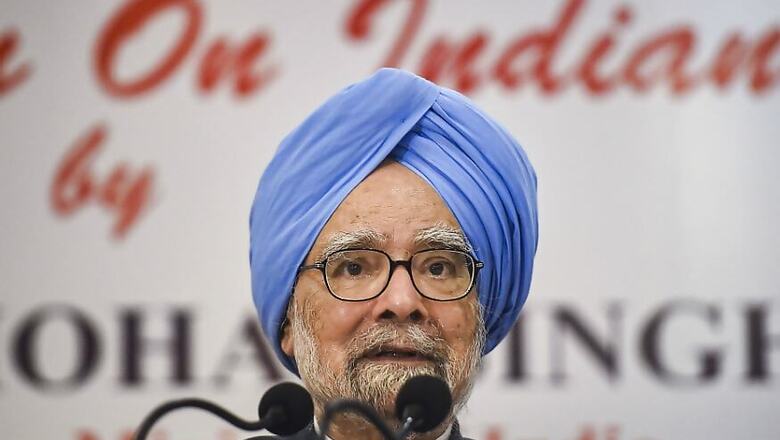
views
New Delhi: Former Prime Minister and senior Congress leader Manmohan Singh on Friday said the current state of the Indian economy was “unacceptable”, soon after the second quarter’s growth numbers revealed that the Gross Domestic Product (GDP) had hit the lowest in six years.
Terming the decline from 5% to 4.5% as worrisome, Singh said, “The sharp decline of GDP from 5% in Q1 to 4.5% in Q2 is worrisome. Mere changes in economic policies will not help revive the economy.”
Among the sectors that took a hit this quarter is the manufacturing industry that witnessed negative growth in the second quarter as the sector grew at -1%.
Singh, delivering his valedictory address at a national conclave on economy here, urged his successor Narendra Modi to set aside "his deep-rooted suspicion" of society and nurse India back to harmonious, mutually trustworthy society that can help the economy soar.
Singh said mutual trust is the bedrock of societal transactions fostering economic growth, but "our social fabric of trust, confidence is now torn and ruptured". The "toxic combination of deep distrust, pervasive fear and a sense of hopelessness in our society" is stifling economic growth, he said.
"The GDP figures released earlier today point the growth rate of our economy in the second quarter of the current fiscal year is as low as 4.5%. This is clearly unacceptable. And, the aspirations of our people want that this country should grow at 8% to 9% per annum. Therefore, the sharp decline in growth rate from 5% in first quarter to 4.5% in second quarter is indeed worrisome," he said.
Singh, an eminent economist himself, said with an absolute majority in Lok Sabha and low global oil prices, the government has a once-in-a-generation economic opportunity to catapult India to the next phase of economic development and create new jobs for hundreds of millions of youth.
"I urge the Prime Minister to set aside his deep-rooted suspicion of our society and nurse us back to a harmonious, confident and mutually trustworthy society that can revive the animal spirits and help our economy soar," he said in a direct message to Modi.
While Singh lamented "deeply worrying" state of economy, he said the state of the society is even more worrisome.
"But today, I will argue how the state of our society is even more worrying and that is a fundamental reason for the precarious state of our economy. I will talk today, largely as a concerned citizen and as an economist, so that we can keep politics out of this important discussion," said Singh.
A nation's state of the economy is also a reflection of the state of its society, he said.
"An economy is a function of the numerous exchanges and social interactions among the people and institutions. Mutual trust and self-confidence are the bedrock of societal transactions that fosters economic growth. Our social fabric of trust and confidence is now torn and ruptured," he said.
"There is a palpable climate of fear in our society today. Many industrialists tell me they live in fear of harassment by government authorities. Bankers are reluctant to make new loans, for fear of retribution. Entrepreneurs are hesitant to put up fresh projects, for fear of failure attributed to ulterior motives," he said.
"Policy makers in government and other institutions are scared to speak the truth or engage in intellectually honest policy discussions. There is profound fear and distrust among our various economic participants. Public trust in independent institutions such as the media, judiciary, regulatory authorities, and investigative agencies has been severely eroded. This toxic combination of deep distrust, pervasive fear and a sense of hopelessness in our society is stifling economic activity and hence economic growth," he said.
Singh said the root cause of this is the government's policy doctrine that seems to suspect every industrialist, banker, policy maker, regulator, entrepreneur and citizen, which has halted economic development with bankers unable to lend, industrialists unable to invest and policymakers unable to act.
"The Modi government seems to view everything and everyone through a tainted prism of suspicion and distrust through which every policy of previous governments was considered of bad intent, every loan sanctioned was undeserving, every new industrial project was crony in nature and so on," he said.
Singh, who was among the first to criticise the current government's 2016 decision to ban Rs 500 and Rs 1,000 currency notes, reiterated that the move had paralysed the economy.
"And the government has positioned itself as some saviour, resorting to foolhardy moral-policing policies such as demonetisation, that have proved to be disastrous. For economic growth to revive, it is very important that the government enthuses trust and confidence. It is very important for businessmen, capital providers and workers to feel confident and exuberant rather than being fearful and nervous. This is possible only if the government sheds its current doctrine and begins to trust India's farmers, India's entrepreneurs and India's citizens at large," he said.
"There is no one today that can deny the sharp slowdown in India's economy and its disastrous consequences, particularly for farmers, youth and the poor. But it is my belief that mere changes in economic policy alone will not help revive the economy. We need to change the current climate in our society from one of fear to one of confidence for our economy to start growing robustly again," he said.
India is now a $3 trillion global economic powerhouse driven largely by private enterprise and it is not a tiny command and control economy that can be bullied and directed at will, he noted.
"Nor can it be managed through colourful headlines and noisy media commentary. Shooting down messengers of bad news or shutting off economic reports and data is juvenile and does not behove a rising global economic powerhouse. No amount of subterfuge can hide the performance and analysis of a $3 trillion market economy of 1.2 billion people. Economic participants respond to social and economic incentives, not diktats or coercions or public relations," he said.
The government data released on Friday showed that the nominal GDP growth for the second quarter also fell to 6.1% as compared to 8% in the previous quarter. The GVA growth also dipped to 4.3% in comparison with 4.9% in the first quarter of the ongoing financial year.
This is the fifth consecutive quarter to have witnessed a fall. Ahead of the release of the numbers, government data released showed that the output of eight core infrastructure industries contracted by 5.8% in October, indicating the severity of the economic slowdown.















Comments
0 comment